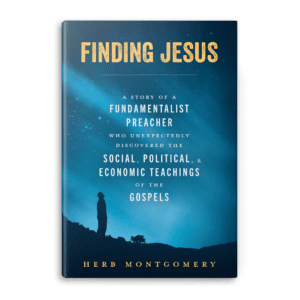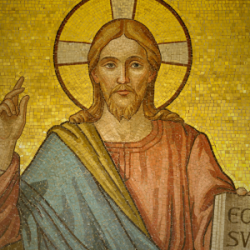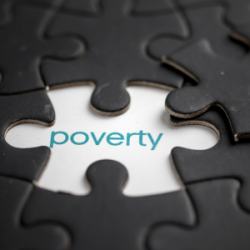
Community, on the other hand, is a way of finding security to weather potential future hardships together. Even evolutionarily, species that have proven to be the “fittest” over time, are species that don’t go it alone but that practice care for vulnerable members rather than some taking care of themselves at the expense of others.
Welcome Readers! Please subscribe to Social Jesus Here.
(Read this series from the beginning at Part 1 and Part 2.)
This, too, was a common theme in the early Jesus community. Consider the following words from 1 Timothy:
“Command those who are rich in this present world not to be arrogant nor to put their hope in wealth, which is so uncertain, but to put their hope in God.” (1Timothy 6:17)
What does it mean in this context to “put their hope in God”. James Robinson, author of books on the historical Jesus and the gospel that Jesus taught, gives insights on what it might have meant for believers to “put their hope in God.”
“Such ‘security’ [or hope] should be replaced by God reigning, which means both what I trust God to do (to activate you to share food with me) and what I hear God telling me to do (to share clothes with you). We should not carry money while bypassing the poor or wear a backpack with extra clothes and food while ignoring the cold and hungry lying in the gutter. This is why the beggars, the hungry, the depressed are fortunate: God, that is, those in whom God rules, those who hearken to God, will care for them. The needy are called upon to trust that God’s reigning is there for them (“Theirs is the kingdom of God”) . . . Jesus’ message was simple, for he wanted to cut straight through to the point: trust God to look out for you by providing people who will care for you, and listen to him when he calls on you to provide for them.” (James M. Robinson, The Gospel of Jesus, Kindle Location 71)
Paul’s letter to the Corinthians also suggests how the members of early Jesus communities practiced this:
“Our desire is not that others might be relieved while you are hard pressed, but that there might be equality. At the present time your plenty will supply what they need, so that in turn their plenty will supply what you need. The goal is equality.” (2 Corinthians 8:13)
How can wealth be used, today, not to give us individual, privatized security but to build community where our security is in each other, in people? The Jesus story is offering us two options, two competing place sin which to “put our trust.” We can either put our hope in hoarding money against potential future hardships, or we can put our hope in a community of people who are dedicated to making sure their resources care for those in their community. Jesus’ way is about facing the future together, rather than alone. It’s about having each other’s back.
Here in the United States, we are continuing to move toward a society that leaves each person on their own. From Supreme Court rulings to local political supermajorities, we are shaping a country in such a way that leaves people on their own to pull themselves up by bootstraps they don’t even have. Those our system makes most vulnerable are the most being harmed.
Some societies and countries are deeply committed to democracy and also have strong social commitments to one another. They make sure community members’ needs are met. We, too, can still practice the freedom of democracy while we move toward making sure everyone in our democracy has what they need to thrive. These are not mutually exclusive goals. In fact, making sure everyone in our democracy is on level ground is deeply democratic in itself.
This call also harmonizes much more with the call of Jesus to work toward shaping a world where we are committed not to isolated, self-sufficiency in facing survival challenges on our own, but to practice the Golden Rule, love our neighbor as ourselves, and share with those who are in need. As the books of Acts says, “Each according to their ability, and each according to their needs.”
 Herb’s new book, Finding Jesus: A story of a fundamentalist preacher who unexpectedly discovered the social, political, and economic teachings of the Gospels, is now available at Renewed Heart Ministries.
Herb’s new book, Finding Jesus: A story of a fundamentalist preacher who unexpectedly discovered the social, political, and economic teachings of the Gospels, is now available at Renewed Heart Ministries.














